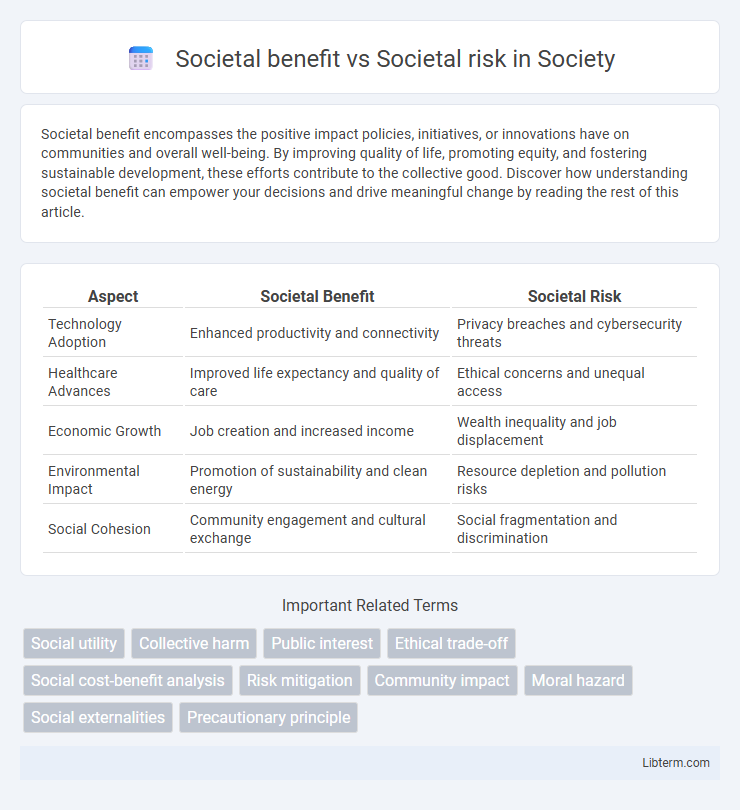Societal benefit encompasses the positive impact policies, initiatives, or innovations have on communities and overall well-being. By improving quality of life, promoting equity, and fostering sustainable development, these efforts contribute to the collective good. Discover how understanding societal benefit can empower your decisions and drive meaningful change by reading the rest of this article.
Table of Comparison
| Aspect | Societal Benefit | Societal Risk |
|---|---|---|
| Technology Adoption | Enhanced productivity and connectivity | Privacy breaches and cybersecurity threats |
| Healthcare Advances | Improved life expectancy and quality of care | Ethical concerns and unequal access |
| Economic Growth | Job creation and increased income | Wealth inequality and job displacement |
| Environmental Impact | Promotion of sustainability and clean energy | Resource depletion and pollution risks |
| Social Cohesion | Community engagement and cultural exchange | Social fragmentation and discrimination |
Understanding Societal Benefit and Risk
Understanding societal benefit involves evaluating how innovations improve quality of life, economic growth, and social well-being by providing access to education, healthcare, and sustainable resources. Societal risk assesses the potential negative consequences such as privacy violations, inequality, environmental harm, and unintended social disruptions that can arise from new technologies or policies. Balancing societal benefit and risk requires comprehensive analysis of long-term impacts and inclusive stakeholder engagement to create resilient and equitable outcomes.
Historical Perspectives on Societal Impact
Historical perspectives on societal impact reveal that technological advancements have consistently generated both societal benefits and risks, with innovations like the Industrial Revolution leading to economic growth and improved living standards alongside environmental degradation and labor exploitation. The introduction of nuclear technology illustrated massive societal benefits in medicine and energy production, while simultaneously posing grave risks such as nuclear proliferation and catastrophic warfare. Analyzing these historical examples underscores the importance of balancing societal progress with ethical considerations and risk management to maximize positive outcomes.
Measuring Societal Benefit
Measuring societal benefit involves quantifying positive impacts such as improved public health, economic growth, and social equity. Metrics include reduced disease prevalence, increased employment rates, and enhanced quality of life indicators. Data-driven evaluations enable policymakers to balance innovation advantages against potential societal risks effectively.
Identifying Societal Risks
Identifying societal risks involves analyzing potential threats that impact public health, safety, and social stability, such as environmental hazards, technological failures, and economic disparities. Quantitative risk assessment tools and stakeholder consultations are essential in detecting vulnerabilities and prioritizing interventions. Effective risk identification enables policymakers to mitigate negative outcomes while balancing innovation and ethical considerations.
Case Studies: Benefits Outweighing Risks
Case studies in renewable energy projects demonstrate that societal benefits such as reduced carbon emissions and job creation often outweigh risks like environmental disruption and initial investment costs. Improved public health outcomes from decreased pollution and long-term economic growth further emphasize the positive impact on communities. These examples highlight that with proper planning and mitigation strategies, the advantages of innovation frequently surpass potential societal risks.
Case Studies: Risks Outweighing Benefits
Case studies examining societal risk versus benefit often reveal scenarios where risks surpass benefits, such as in the use of facial recognition technology leading to privacy infringements and biased law enforcement. Examples from the deployment of genetically modified organisms (GMOs) highlight concerns over ecological disruption and long-term health effects outweighing agricultural gains. These cases demonstrate the necessity for comprehensive risk assessments and stricter regulatory frameworks to safeguard public welfare.
Balancing Innovation and Caution
Balancing innovation and caution involves evaluating the societal benefits of technological advancements against potential societal risks such as privacy breaches, job displacement, and ethical concerns. Effective regulation and ethical frameworks help maximize innovation's positive impact while minimizing harm to public welfare and social equity. Striking this balance ensures sustainable progress that protects society without stifling creativity or economic growth.
Ethical Considerations in Societal Progress
Ethical considerations in societal progress require balancing societal benefits such as improved healthcare, education, and technology with potential societal risks including privacy violations, inequality, and environmental harm. Evaluating long-term impacts ensures that advancements promote equity, human rights, and sustainability while minimizing unintended consequences. Governance frameworks and inclusive public dialogue play crucial roles in aligning innovations with ethical standards and social values.
Policy Approaches to Maximizing Benefit, Minimizing Risk
Policy approaches to maximizing societal benefits while minimizing risks emphasize proactive regulation, transparent stakeholder engagement, and adaptive governance frameworks. Implementing evidence-based risk assessments, promoting ethical standards, and incentivizing innovation ensure balanced outcomes that enhance public welfare and mitigate potential harms. Strategic collaboration between government, industry, and civil society strengthens resilience against unintended consequences and fosters sustainable development.
The Future Outlook: Navigating Societal Outcomes
Advancements in technology and policy innovation significantly influence societal benefits and risks, shaping the trajectory of public health, economic stability, and environmental sustainability. Proactive governance and ethical frameworks are essential to mitigate risks associated with emerging technologies such as artificial intelligence and biotechnology while maximizing positive impacts on social equity and quality of life. Continuous assessment of societal outcomes and adaptive strategies will drive informed decision-making, fostering resilient communities and sustainable development in the face of uncertain future challenges.
Societal benefit Infographic

 libterm.com
libterm.com